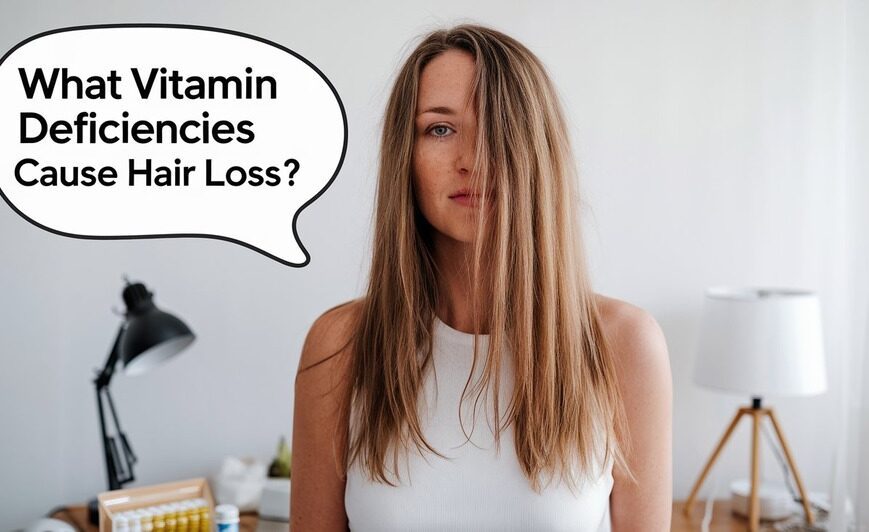Have you ever wondered what vitamin deficiencies cause hair loss? It’s a question that hits hard when you’re staring at a few more strands in the shower drain than usual.
If you’re like me, you’ve probably asked, Am I missing something from my diet? Is it just about the vitamins?
Spoiler alert: Yes, vitamin deficiencies can cause hair loss. But it’s not just one vitamin. Several nutrients affect hair health, and if you’re missing out, it shows—directly.
What vitamin deficiencies cause hair loss?
Let’s dive into this together.
When are these vitamins causing hair loss?
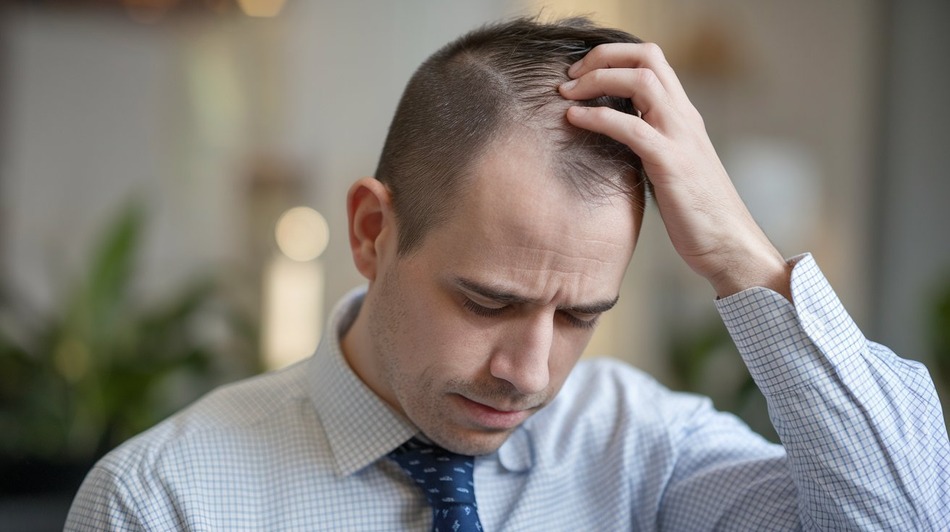
It would be best to find out what vitamin deficiencies cause hair loss. Vitamin deficiencies are to blame for hair loss. It may even be slightly challenging to diagnose the root cause, but sure signs indicate a nutritional deficit. You might develop brittle nails, persistent fatigue, or start to see thinning hair, and any of these symptoms could mean your body is not supplied with enough nutrients.
Here’s a quick checklist to help you determine potential vitamin deficiencies related to hair loss:
These signs are signals from your body telling you that it wants some nutrients that are considered indispensable. If you develop any of these symptoms, you must check your diet and seek medical help to be tested appropriately.
Signs or manifestations of a Vitamin deficiency that causes hair loss

Do you have a deficiency?
Keep an eye out for these signs:
- Increased Shedding: Have you observed any differences lately, such as hair on your brush or in the shower? This could be a red flag.
- Thinning Areas: If some areas of your head are thinning, this may suggest a deficiency.
- Brittle or Dry Strands: Most people do not know that hair health indicates nutritional health, and when hair feels weak or breaks fast, this is a sign that nutrition is lacking.
- Fatigue or Weakness: Are you feeling exhausted? This could be due to the absence of vital vitamins in your diet.
- Pale Skin: One sign is a change in the shade of skin, which can efficiently treat deficiencies of different types.
If you’re experiencing these symptoms, it may be time to assess your vitamin intake and consult a healthcare professional. Addressing these deficiencies can help restore your hair’s health and vitality.
What Vitamin Deficiencies Cause Hair Loss? Let’s Break It Down
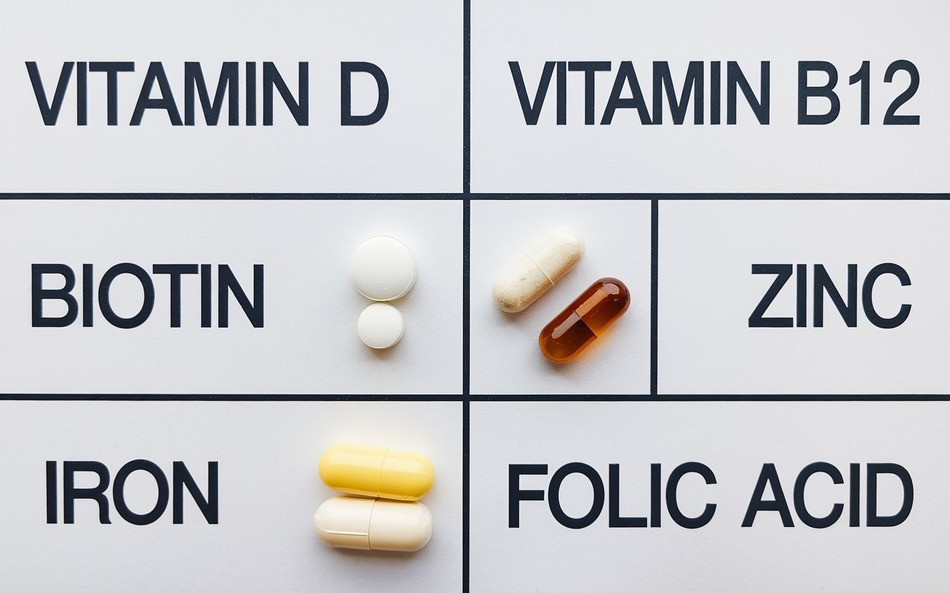
First off, let’s get straight to the point. What Vitamin Deficiencies Cause Hair Loss? Specific vitamins are crucial for keeping our hair healthy and strong. Lacking these vitamins can lead to thinning hair or even bald patches.
Here are the main culprits:
“Vitamin D, Vitamin B12, Biotin (Vitamin B7), Iron, Zinc and Folic Acid.“
Hair and Scalp Problems Caused by Vitamin D Deficiency
- Hair Thinning: A vitamin D deficit causes hair to be less healthy or grow less thick across the scalp due to compromised strand performance.
- Excessive Shedding: A deficiency may curtail the hair-growing (anagen) phase, leading to hair loss.
- Patchy Hair Loss: Vitamin D deficiency is also related to diseases such as alopecia areata, leading to hair loss in some body regions.
- Weakened Hair Follicles: A process called minoxidil has been shown to have vitamin D receptors and manage hair follicle growth. When the blood level of vitamin D is low, the follicles may reduce their ability to grow new hair.
- Scalp Health Issues: Vitamin D plays a crucial role in the general condition of hair roots, and if a person lacks it, he might experience dryness or skin irritation, including dandruff.
- Immune System Impact: Lack of it affects the immune system, which causes scalp inflammation, thus worsening hair loss.
Solutions:
Understanding Vitamin B12 and Hair Loss
- Hair Thinning: Insufficient Vitamin B12 means less oxygen is getting to the hair follicles, hence less nourishment for hair and making them thin.
- Impaired Hair Growth: B12 also plays a crucial role in forming red blood cells, which transport oxygen to the hair follicle’s scalp location. A deficiency affects the function of the hair follicle, which in turn slows down the hair’s growth.
- Increased Hair Shedding: With inadequate amounts of B12, hair Line – do hair follicles start to become dormant; this means shedding off more hair than necessary.
- Weak Hair Strands: B12 deficiency also causes hair to become more rigid and vulnerable to breakage.
- Scalp Health: Lack of sufficient oxygen due to low B12 levels can lead to an unhealthy-looking scalp and affect hair growth.
Solutions:
Vitamin B7 deficiency and its particular effect on hair loss.
- Brittle Hair: A lack of biotin is terrible for hair because it can make it brittle and fragile, more susceptible to breakages, and has unhealthy split ends.
- Thinning Hair: Lack of adequate biotin levels might affect hair, causing decreased density and less healthy-looking hair.
- Increased Shedding: Low levels of biotin also affect the normal hair growth cycle; thus, hair may begin to fall off in large numbers.
- Dull Appearance: Hair may seem lifeless and lose its sheen because the hair strands have become weak and cannot hold moisture.
- Scalp Health Issues: Biotin is associated with maintaining skin and hair quality, and when deficient, it causes dry scalp states that influence hair detriment.
Solutions:
Iron Deficiency: The Connection to Hair Loss
- Reduced Oxygen Supply: Iron is critical to synthesising haemoglobin, which transports oxygen to hair follicles. Deficiency can lower blood oxygen levels, preventing hair from growing.
- Increased Hair Shedding: A deficiency in this microelement is associated with telogen effluvium, an early stage of the hair follicle cycle that causes enhanced hair loss.
- Thinning Hair: Iron deficiency affects all hair but particularly results in general thinning as follicles lessen their hair-support ability.
- Weak Hair Strands: Iron-deficiency anaemia leaves hair dry, challenging, and split, making it easy for hair to break.
- Scalp Health: Iron deficiency may also be responsible for scalp problems, which negatively impact hair growth and general health.
Solutions:
Zinc and Hair Loss
- Role in Hair Growth: Zinc is necessary for the physiological processes involving follicle tissues, including hair tissue division and repair. It also aids in preserving the hair’s natural architecture.
- Hormonal Balance: This element stabilises the hormones required for hair growth, such as testosterone. A deficiency might result in an abnormal situation in the body that facilitates hair loss.
- Prevention of Hair Shedding: Sufficient zinc in the body mitigates hair loss. A deficiency can interfere with hair growth and lead to excessive hair loss.
- Scalp Health: Zinc has anti-inflammatory properties, and individuals receiving it had healthy scalps. A healthy scalp can lead to diseases such as dandruff or irritation of hair, which in turn will hinder hair growth.
- Immune Function: Zinc is good for immunity, but a deficiency may lead to scalp infections that cause hair loss.
Solutions:
Folic Acid Deficiency: A Hidden Cause of Hair Loss
- Role in Cell Division: It is essential for synthesising DNA and RNA and learning correctly during fetal development as it is a vitamin B9. Because hair follicles are among some of the most professional cellular proliferative tissues in the human body, any shortage hinders hair growth, resulting in thinning.
- Increased Hair Shedding: Folates are a group of water-soluble vitamins. Low levels of folic acid can hinder hair growth because hair follicles move into the telogen phase, meaning more hair will fall off.
- Weak Hair Strands: Folic acid deficiency is another reason hair may be fragile and thin; it will easily split and break.
- Scalp Health: Folic aids ensure hair follicles are well supplied due to their flavonoids and role in enhancing scalp circulation. A deficiency may lead to poor circulation and minimise hair health.
- Potential for Anemia: Folates also play an essential role in the synthesis of DNA, and when one lacks them, one is prone to anaemia. Since the blood supply to the hair follicle is already scarce, hair loss is bound to increase when it is further diminished due to a low oxygen supply.
Solutions:
I hope you understand what vitamin deficiencies cause hair loss. Recognising the significance of vitamins such as D, B12, iron, zinc, and folic acid prevents hair loss. Incorporating foods rich in these essential nutrients into your diet can help nourish your hair follicles and promote healthy growth.
Iron deficiency causes hair loss by reducing oxygen to hair follicles. Pair iron-rich foods like spinach with Vitamin C from oranges to improve absorption and fight hair loss.
Can One Diagnose Vitamin Deficiency Related to Hair Loss?
If you believe vitamin deficiencies are to blame for your hair loss, and you’re wondering what vitamin deficiencies cause hair loss, don’t procrastinate—consult your doctor for proper diagnosis and treatment.
A mere haemoglobin test can quickly tell you what nutrient you lack.
It is the simplest way to establish why your hair is thinning. It may be due to low Vitamin D, B12, or any nutrient.
Effective Treatments for Vitamin Deficiencies Causing Hair Loss
Here’s a table summarising effective dietary changes and supplements to address what vitamin deficiencies cause hair loss, helping you combat hair loss through proper nutrition:
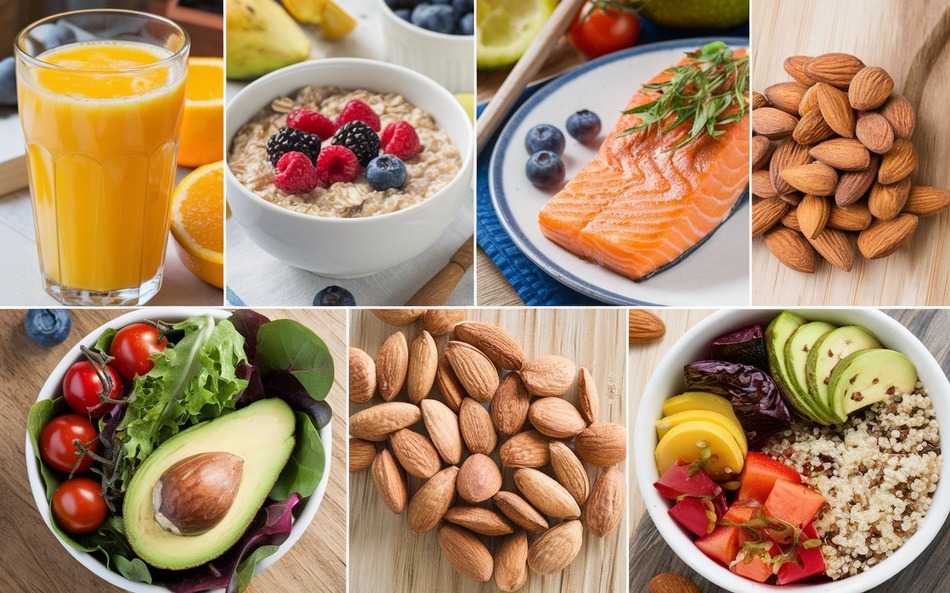
| Vitamin | Food Sources | Supplements |
|---|---|---|
| Vitamin D | – Fortified foods (dairy products, cereals) | Consider Vitamin D supplements after consulting a healthcare provider. |
| Vitamin B12 | – Dairy products (milk, cheese, yogurt) – Fortified cereals | B12 supplements may be recommended if deficient. |
| Iron | – Spinach – Lentils | Iron supplements can be taken under medical guidance. |
| Zinc | – Nuts (cashews, almonds) – Seeds (pumpkin seeds, sunflower seeds) – Whole grains (quinoa, brown rice) | Zinc supplements may be beneficial if levels are low. |
| Folic Acid | – Leafy greens (kale, spinach) – Beans (black beans, chickpeas) – Citrus fruits (oranges, lemons) | Folic acid supplements can help if you’re deficient. |
Important Note
Before beginning any new supplement regimen, learn what vitamin deficiencies cause hair loss from your healthcare professional. They can recommend the proper dosage and guarantee it won’t interfere with any other prescriptions or problems you may have.
By making these dietary adjustments and incorporating supplements, you can efficiently address vitamin deficiencies that cause hair loss. This approach empowers you to take control of your hair health.
Though not a vitamin, magnesium is essential for healthy hair growth. Low magnesium can result in hair loss. Add nuts, seeds, and whole grains to your meals.
Preventing Hair Loss Through Nutritional Balance
To understand what vitamin deficiencies cause hair loss, the best prevention is eating a balanced diet that ensures you get essential nutrients daily.
Critical Nutrients for Healthy Hair
To keep your hair strong and vibrant, focus on these essential nutrients:
Proteins: Hair is mainly made of protein, so include plant-based bases like legumes (such as lentils, chickpeas, and black beans), nuts (like almonds and walnuts), seeds (such as chia and flaxseeds), and whole grains (like quinoa and brown rice) in your diet. These foods provide essential amino acids required for healthy hair growth and maintenance.
Vitamins:
Vitamin A: Supports cell growth. It is found in carrots, sweet potatoes, and spinach.
Vitamin C: This vitamin helps with iron absorption and collagen production. Sources include citrus fruits, strawberries, and bell peppers.
Vitamin E is an antioxidant. Nuts, seeds, and green leafy vegetables are great sources.
Minerals:
Iron is essential for oxygen transport to hair follicles. Include beans and fortified cereals.
Zinc: Crucial for tissue repair and growth. Sources include nuts, seeds, and whole grains.
Selenium helps in the production of antioxidants that promote hair health. Deficiency can lead to hair thinning. Brazil nuts and seafood are good sources.
Four ways to achieve healthy nutrition.
To understand what vitamin deficiencies cause hair loss, including foods rich in essential nutrients in your diet can help improve the quality of your hair and promote overall health.
How to Prevent Hair Loss from Vitamin Deficiencies
Now that you know what vitamin deficiencies cause hair loss, let’s discuss prevention.
It’s all about ensuring your body gets the proper nutrients to keep your hair healthy and strong. Here’s what I’d recommend:
- Get a blood test to check for any deficiencies.
- Eat a balanced diet with plenty of lean proteins, leafy greens, and whole grains.
- Take supplements to fill any nutrient gaps and support hair growth.
Prevention is simple when you focus on feeding your body what it needs!
Expert Tips on Managing Vitamin Deficiencies for Healthy Hair
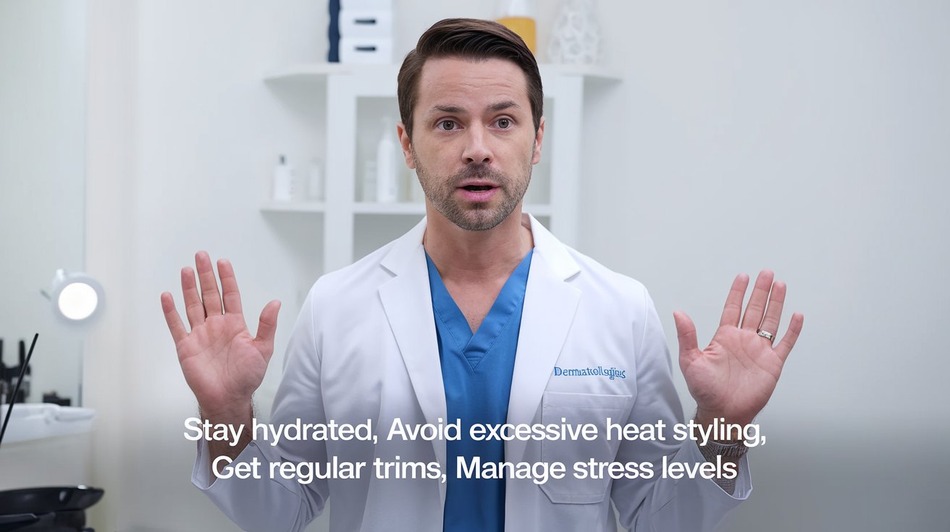
Here are some quick, expert-backed tips to help you manage what vitamin deficiencies cause hair loss:
- Stay Hydrated
Water is an essential component of hair; thus, people need to drink water for overall health.
Drink at least 7 to 8 glasses of water daily to ensure your body and Scalp remain moist. - No Reliance on High Heat Styling Tools
Education on Styling Trends: Overprocessing the hair with tools such as irons, lighters, etc., results in breakage and a reduction in hair volume.
Avoid using a blow dryer, straightener, or curling iron frequently. But if needed, always make sure to use a heat protectant. - Get Regular Trims
Don’t let your hair split against the surface, or your hair’s overall health will look not much better and stronger.
Reschedule the trims every 6—8 weeks to strengthen the hair and reduce strand breakage. - Control Stress Amounts
Another factor is tension, which exacerbates hair loss over time. Stress should be avoided at all costs.
Take part in stress-relieving pursuits such as:
Exercise: Lowers blood pressure and increases blood flow.
Meditation: Reducing stress improves mental health and nourishes hair.
These methods allow one to control vitamin shortages and enhance hair quality.
By following these expert tips, you can effectively manage vitamin deficiencies and support hair health. Remember, consistency is key!
Conclusion
Understanding what vitamin deficiencies cause hair loss is essential for maintaining healthy hair.
By acknowledging the crucial role of essential vitamins—such as Vitamin D, B12, iron, zinc, and biotin—in hair health, you can proactively take steps to prevent deficiencies and promote stronger, healthier hair.
Incorporating a balanced diet rich in these nutrients, staying hydrated, managing stress, and avoiding excessive heat styling are all effective strategies for supporting hair’s vitality.
By addressing what vitamin deficiencies cause hair loss, you can make diet changes that support healthier, stronger hair.
If you suspect a deficiency, it’s vital to seek professional advice. Consulting with a healthcare provider for a proper diagnosis and treatment options is a crucial step in maintaining your hair’s health.
These steps help ensure your hair remains strong, vibrant, and resilient against loss.
FAQs
What vitamin deficiencies cause hair loss?
The primary vitamin deficiencies that cause hair loss include vitamin D, B12, biotin (vitamin B7), folic acid (vitamin B9), and vitamin E. Deficient levels of these vitamins can disrupt the hair growth cycle.
What symptoms indicate a vitamin deficiency related to hair loss?
Recognising symptoms of vitamin deficiencies related to hair loss is essential. Common signs include increased shedding, thinning areas on the scalp, and brittle or dry strands. You may also experience fatigue or weakness, mainly from iron or B12 deficiencies, and pale skin can indicate a lack of essential nutrients. If you notice these symptoms, please consult a healthcare professional for evaluation and advice.
How can I determine what vitamin deficiencies cause hair loss?
If you suspect that vitamin deficiencies are causing your hair loss, consult a healthcare professional. They can conduct blood tests to identify weaknesses and recommend dietary changes or supplements.
How can I address vitamin deficiencies that cause hair loss?
To address deficiencies that cause hair loss, incorporate foods rich in essential vitamins like vitamin D, B12, biotin, iron, zinc, leafy greens, and nuts. Staying hydrated is also vital for healthy hair. If deficiencies persist, please look at supplements after consulting a healthcare provider. Additionally, managing stress is essential, as it can worsen hair loss. These strategies can collectively help restore your hair’s health.
When should I see a doctor about my hair loss?
You should see a doctor about your hair loss if you notice significant changes in hair density, such as sudden or excessive shedding, thinning patches, or bald spots. Additionally, if you’re experiencing other symptoms like fatigue, brittle nails, or pale skin, these could indicate underlying health issues or vitamin deficiencies. Consulting a healthcare professional for an evaluation and potential testing can help pinpoint the cause of your hair loss.
Can lifestyle changes help prevent vitamin deficiencies?
Absolutely! Eating a balanced diet, staying hydrated, managing stress, and avoiding excessive heat styling can all help prevent vitamin deficiencies and promote healthy hair growth.
